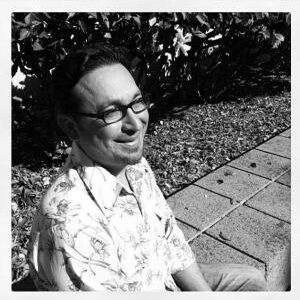
Photo courtesy University of California, Santa Barbara
Oral historian Horacio Roque Ramírez died on Christmas Day 2015 in Echo Park, Los Angeles, at age 46. His death was a tragic loss for friends, family, colleagues, and students that remains incalculable. A vibrant scholar, colleague, teacher, mentor, friend, and more, Horacio was comfortable and brightest among queer, Latinx, immigrant, first-generation, working-class, and intellectually curious people. Horacio did not suffer fools. He respected hard work. He smiled wide.
Horacio Nelson Roque Ramírez was born in Santa Ana, El Salvador, in 1969, the youngest of eight siblings. According to his sister Norma Roque, he was considered the “star of the family.” In 1981, due to the civil war’s violence and disruption, Horacio migrated with his family to the United States. Arriving in this country at age 12, Horacio was equal parts Salvadoran and of the United States.
For his BA in psychology and MA in history, Horacio attended the University of California (UC), Los Angeles. He then pursued a PhD in ethnic studies at UC Berkeley, where I met him in the late 1990s. In graduate school, everyone admired Horacio. Always one of the smartest in the room, definitely the most prepared, and politically on point, he was incredibly generous with advice. He was emphatic in his suggestions, but he never said “I told you so” if you didn’t follow his advice (unless you didn’t work hard). He gave me and others the feeling that he was on our side and would be critical, if need be, because he wanted you to succeed.
After he earned his PhD in 2001, Horacio joined the Chicano studies faculty at UC Santa Barbara. He grounded his scholarly and activist work in oral history, and he worked with queer Chicano archivist Luis Alberto de la Garza to form La Colectiva and build an archive of queer Latina/o/x San Francisco—what de la Garza called “our own archive.” “Horacio created a network, which was novel,” said de la Garza. “He treated everyone fairly,” navigating gendered and interethnic tensions among Latinas/os/xes—an important topic within his work. He gravitated toward the rank-and-file community member. He knew that their stories were overshadowed by well-known leaders, by hierarchies of privilege and sexism. He brought people together who remain together today.
Horacio’s scholarship mined these stories for history, looking for insights about political struggle and identity. He found the extraordinary in the ordinary and marginalized. If you were nonwhite, queer, transgender, impoverished, an immigrant, underrepresented among the underrepresented, had contracted HIV or AIDS, or a combination of these, Horacio knew that an entangled set of burdens weighed on you. So when he registered the stories of his subjects, and when he wrote about them, Horacio acknowledged the full pain and glory of their struggles and the importance of their lives and deaths—generosity he also extended to his friends, peers, and students. He always gave credit for what you had survived.
Horacio worked with Proyecto ContraSIDA Por Vida in the Bay Area during some of the darkest days of the AIDS pandemic, when Black and Brown people were being ignored and overshadowed by the scientific strides helping the mainstream HIV/AIDS community. A book chapter grew from this that explored the obituaries of Latino men in the Bay Area Reporter and other newspapers, balancing grief with his unique exhilaration for his work.
At his death, Horacio was completing a monograph that documented queer Latina/o/x San Francisco from the 1960s to the 1990s. With Nan Alamilla Boyd, he edited Bodies of Evidence: The Practice of Queer Oral History (Oxford Univ. Press, 2012). His numerous journal articles and book chapters still are read and taught today, including “‘That’s My Place!’: Negotiating Racial, Sexual, and Gender Politics in San Francisco’s Gay Latino Alliance, 1975–1983” (Journal of the History of Sexuality, 2003), a staple in my classroom since publication.
So much can be said about Horacio’s scholarship and activism, and especially about the work left uncompleted. We collectively share that loss. Perhaps Horacio’s labors can be recovered, and if not, I hope that scholars continue to build on his legacy and contributions, using them as a compass to forge news paths in their own unique ways, just like Horacio did.
David Hernández
Mount Holyoke College
This work is licensed under a Creative Commons Attribution-NonCommercial-NoDerivatives 4.0 International License. Attribution must provide author name, article title, Perspectives on History, date of publication, and a link to this page. This license applies only to the article, not to text or images used here by permission.